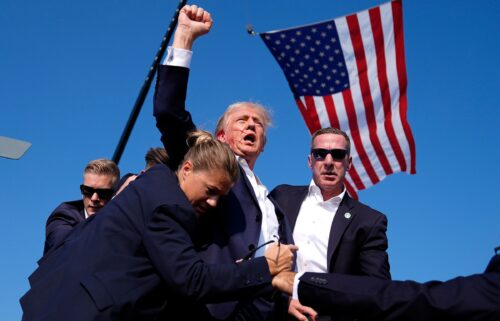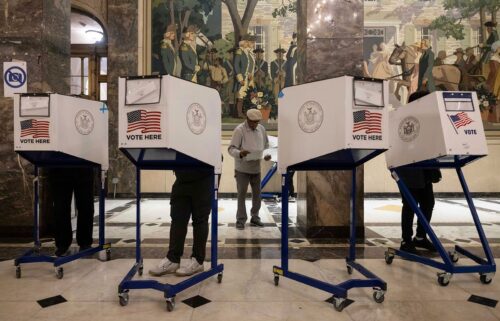White supremacy and hate are haunting Asian Americans
In one sense, it’s immaterial whether the accused killer in the Atlanta spa shootings admits to a racist motivation. Asian Americans, already traumatized by a rising tide of hate, violence and rhetoric, have been living in fear for months.
The murders of eight people, including six Asian women, among them four South Koreans, further disoriented and horrified a community already unfairly stigmatized by racial association during a pandemic that originated in China. And they laid bare for the rest of the country the agony of yet another minority group left to question its place in America, at a time of rising attacks and harassment amid cresting White nationalism and domestic extremism.
Many Asian Americans feel exposed by a torrent of dangerous and racially motivated rhetoric by national figures on a cultural crusade. Most prominently that includes ex-President Donald Trump, who presided over four years of rising racial tensions and often used division as a tool of personal power.
Campaigners talk of a perfect storm of prejudice targeting the Asian American and Pacific Islander community that stirred latent hatreds as Covid-19 first arrived in the US, and was exacerbated by Trump’s relish in flinging around terms like “China virus.”
“There is a lot of fear in the community not just because of the hate crimes of the last year, which are the result of xenophobic messaging around the pandemic by the former President,” Georgia state Rep. Bee Nguyen, a Democrat, told CNN’s Erin Burnett on Wednesday. “There is a lot of history of Asian American violence in this country — and many of our parents or grandparents and ancestors experienced that.”
Anti-Asian hate crimes are up 150% during the pandemic, according to the Center for the Study of Hate and Extremism at California State University, San Bernardino.
NBA veteran Jeremy Lin told CNN’s Anderson Cooper on Wednesday night that while he had experienced bigotry when he was younger, it was now much more pronounced.
“It feels very different. I think growing up, it was always something that might be a little more subtle or verbal. But I think what we are seeing right now is a lot of physical actual violence, lives being taken. A lot of Asian Americans who are looking over their shoulders when they go outside, when they go to the grocery story,” Lin said.
“I think there is a lot of racially charged hatred right now that we’re seeing and feeling.”
The White supremacist threat
Vivien Tsou, national field director for the National Asian Pacific American Women’s Forum, described a personal sense of dislocation and horror after Tuesday’s killings, that she said were deeply felt in her community.
On a day when the new Homeland Security Secretary Alejandro Mayorkas told lawmakers that domestic extremism was the greatest threat to the homeland, Tsou argued that Asian Americans did not face distinct peril but were targeted by the same forces of hate endured by Black Americans and that were evident in the insurrection against the US Capitol on January 6.
“While the focus is on anti-Asian hate, it all stems from White supremacy and anyone can be a scapegoat at any moment,” Tsou said.
“This is something that we need to face together and stand in solidarity,” she said, referring to other ethnic minority groups.
More broadly, the ordeal of the Asian American community revealed another dimension of the much discussed national reckoning over race. A flurry of current events — from the crisis on the southwestern border, to Republicans’ voter suppression efforts, to the disparities in Covid-19 vaccine availability — all revolve to some extent around questions of ethnicity. And they are highlighting the particular pain of minority Americans that can never be felt and is rarely truly appreciated by those in the White majority.
On Wednesday, a prospective juror in the trial of Derek Chauvin, the police officer charged in the killing of George Floyd, was asked by a defense lawyer whether he had personal views that could shape his judgment.
“Being a Black man in America, I experience racism every day,” the unidentified man said. He was later excused from service despite insisting he could deliver a fair verdict.
The exchange didn’t just crystallize the question at the heart of a case with grave national implications — whether the US legal system can deliver justice to a dead Black man or whether an accused White police officer can get a fair trial in such emotive circumstances. It exposed the racism many Blacks, Asians and other minorities believe endemic that other Americans only see after tragedies or national outrages.
Atlanta Mayor Keisha Lance Bottoms, a Democrat, told CNN’s Wolf Blitzer that the Asian American community needed the same consideration shown to Black Americans in the aftermath of Floyd’s death amid a national outpouring over police violence.
“In the same way African Americans across this country ask for support and we asked for people to stand with us over the summer, it’s important that people stand with our Asian brothers and sisters in the same way,” she said. “They are being targeted unfairly and in Atlanta, what we’ve seen — the worst has happened.”
How much is Trump to blame?
The extent to which Trump, who often refused to unequivocally condemn White supremacy, and his enablers are to blame for the rising racial prejudice is at the center of controversy in the wake of Tuesday’s attack.
Democratic Rep. Judy Chu of California told CNN on Wednesday that the hysteria whipped up by the ex-President — who at times referred to Covid-19 as “kung flu” has been disastrous for the community.
“Since the start of the pandemic, he’s been calling this the China virus,” Chu told CNN’s Brooke Baldwin. “So, now we have had a spike in anti-Asian hate crimes and incidents.”
The extent to which the plight of Asian Americans was caught up in Trump’s scorched earth strategy was revealed during a debate about a Democratic House resolution condemning violence against the community in September.
A total of 164 Republicans voted against the measure, which some described as “woke culture on steroids.” Some members objected to drawing a parallel between the impact of the phrase “China virus” and the internment of Japanese Americans in World War II and historic discrimination against Chinese immigrants — both of which scarred America’s conscience and still resonates with many Asian Americans.
The World Health Organization has advised against linking the virus directly to any region or ethnic group precisely because of the hate and harassment that has been endured by Asian Americans.
But one of Trump’s top allies, Ohio GOP Rep. Jim Jordan, said in the debate that the measure was an example of “cancel culture” designed to prevent Americans talking truthfully about where the virus was first discovered.
And even though Trump is no longer in office, much of the Republican Party can’t shake its relish for raising the specter of outsiders — often people of color — while hinting that they threaten majority White American culture.
In a trip to the southern border this week, House Minority Leader Kevin McCarthy, a California Republican, said that in addition to a stream of Central Americans, Yemenis, Iranians, Sri Lankans and “even” Chinese were crossing the frontier.
Victims demand recognition
Increasing attacks on Asian Americans over the last year, including on elder members of the community, have left many scared to leave their homes or unwilling to venture beyond their immediate family networks. People have been verbally abused and accused of spreading Covid-19. Lin was called “coronavirus” on court. There have been especially troubling cases of xenophobic violence against elderly Asian Americans.
“The Asian American community here is in shock,” Christopher Chan, the advisory chair of the Asian American Action Fund Georgia Chapter, told CNN on Wednesday. “We want attention drawn to this rising epidemic of hate crime, of crimes being committed against Asian Americans.”
The specific motive behind the shooting spree in Georgia in which Robert Aaron Long, 21, has been charged, remains unclear according to police.
But Bottoms said on CNN’s “The Situation Room” that it was hard to believe the alleged killer’s reported statement that he was acting on a motive rooted in sex addiction.
“The fact that many of the victims were Asian … and that he targeted these Asian massage parlors. It’s very difficult to ignore that the Asian community has been targeted and it’s happening across the country,” the mayor said.
Whether the rationale for the killing was racial or not, it does seem to have been motivated by some form of hate.
“I know there has been a lot of questions about whether it is racially motivated,” Tsou said. “It is not just race, it is gender. These women were doing a day job to provide for their family. They were going out in a pandemic. This is another layer of fear that we have put upon our communities.”
Community advocates say there has long been an issue of Asian women being objectified because they work in massage parlors or spas.
Esther Kao, speaking on behalf of Red Canary Song, a New York collective that advocates for labor rights for (mostly Asian) massage parlor workers and sex workers, said women in the industry had faced a recent surge of racism.
“But it’s not specific to the sex industry; Chinatown restaurants, workers have also gotten the same kind of threats, and also like lost income during this time,” Kao told CNN’s “Meanwhile in America” newsletter on Wednesday.


